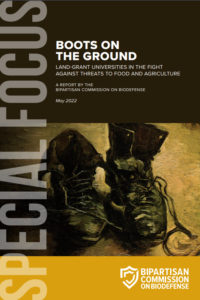Bipartisan Commission on Biodefense Highlights Unique Role of Nation’s Land-grant Universities in Safeguarding America’s Food and Agriculture

FOR IMMEDIATE RELEASE
Contact: Steve Aaron
SRA Communications
(717) 554-8614
steve@SRACommunications.com
BIPARTISAN COMMISSION ON BIODEFENSE HIGHLIGHTS UNIQUE ROLE OF NATION’S LAND-GRANT UNIVERSITIES IN SAFEGUARDING AMERICA’S FOOD AND AGRICULTURE
Land-Grant Universities Engage in Innovative Research and Development, Cooperative Extension Activities, and Disaster Response
WASHINGTON, D.C. (May 9, 2022) – A new report from the Bipartisan Commission on Biodefense finds that America’s land-grant universities can play a critical role in protecting the Nation’s food and agriculture, and details 15 specific recommendations to maximize their effectiveness. Titled Boots on the Ground: Land-Grant Universities in the Fight Against Threats to Food and Agriculture, the report’s recommendations address the coordination of federal and land-grant food and agro-biodefense efforts, early warning of threats to food and agriculture, and incorporation of land-grant universities into preparedness, response, and mitigation of various possible events. Download the report here.
The Commission is releasing the report one day after the anniversary of the passage of the Smith-Lever Act of 1914, which established federal support for land-grant agricultural research, application, and education. This includes sharing biosecurity practices with farms to keep their flocks and herds safe, a high priority in light of the current outbreaks of highly pathogenic avian influenza devastating chicken and turkey farms across the Nation.
“President Lincoln valued higher education and recognized the role dedicated institutions could play in supporting food, animals, and plants when he and Congress established the first land-grant universities in 1862,” said former Senate Majority Leader and Commissioner Tom Daschle, who traveled to Colorado State University in 2019 to host a meeting which helped to inform this new report.
“Building on Lincoln’s legacy, we can strengthen national biodefense of food and agriculture by funding and reinforcing the work of the land-grant universities before an event destroys food, crops, herds, textiles, biofuels, and other agricultural products and devastates our national and global economies. Land-grant universities have their boots on the ground. We need to provide them with what they need to win the war against threats to food and agriculture. It is too great a thing to be left undone.”
The new report describes the lack of an integrated preparedness plan for pandemics affecting food or agriculture. Chronic underfunding has created major vulnerabilities affecting all aspects of preparedness for a biological event. Surveillance and detection systems are fragmented and unable to provide decision-makers with real-time situational awareness to support agile and rational decisions in a major incident. Existing research programs – including the Agriculture and Food Research Initiative and the Agriculture Advanced Research and Development Authority – require additional federal investment.
“We need to better define the roles and responsibilities for, and accountability of, the federal and academic institutions involved in agricultural defense and design a mechanism for effectively coordinating their disparate activities when responding to biological events affecting food and agriculture,” added former Homeland Security Advisor and Commissioner Ken Wainstein, who co-chaired the 2019 meeting at Colorado State University. “A national defense against 21st Century biological threats requires more than current public health and counter-bioweapon efforts. It demands a comprehensive One Health approach to protecting people, food, animals, plants, environments, and bioeconomies to reduce disease and the socioeconomic consequences of naturally occurring outbreaks, laboratory accidents, and biological attacks.”
About the Bipartisan Commission on Biodefense
The Bipartisan Commission on Biodefense was established in 2014 to conduct a comprehensive assessment of the state of U.S. biodefense efforts, and to issue recommendations to foster change. The Commission’s 2015 report, A National Blueprint for Biodefense: Leadership and Major Reform Needed to Optimize Efforts, identified capability gaps and recommended changes to U.S. policy and law to strengthen national biodefense while optimizing resource investments. In its 2021 report, Biodefense in Crisis: Immediate Action Needed to Address National Vulnerabilities, the Commission described the extent to which the federal government had implemented the Commission’s recommendations. Other Commission publications have addressed critical needs for agrodefense; biodefense budgeting; diagnostics; an Apollo Program for Biodefense; an Athena Agenda for implementing the Apollo Program; national biodetection; biodefense of critical infrastructure; and State, Local, Tribal and Territorial response capabilities. In September 2018, the White House released the National Biodefense Strategy, a top recommendation from the Blueprint and in September 2021 released the American Pandemic Preparedness plan, drawing from the Apollo Program report. The Commission continues to address biodefense challenges and to urge reform. Former Senator Joe Lieberman and former Governor Tom Ridge co-chair the Commission. Hudson Institute is the Commission’s fiscal sponsor.

